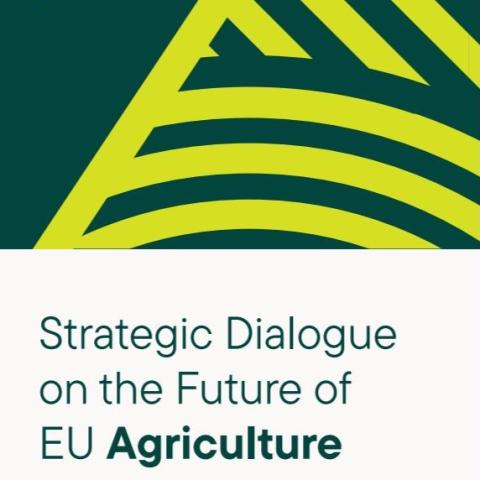European Economic
and Social Committee
Report from the strategic dialogue on the future of EU agriculture
The EESC, as the house of organised civil society in Europe, bringing together employers, workers and civil society organisations, promotes dialogue and participatory democracy. Insufficient or inadequate dialogue leads to conflict, such as the recent farmers’ protests in the European Union. These can be seen as a consequence of decades when farmers’ views have not been taken into consideration and decision-making processes (at EU level and in trade agreement negotiations) have not involved them (see EESC news).
In this context, the EESC welcomes the organisation of the strategic dialogue on the future of EU agriculture, which brought together key stakeholders from across the whole agri-food chain and rural communities, as well as non-governmental organisations and civil society representatives. We are thankful to Professor Peter Strohschneider, the chair of this dialogue, for considering the EESC’s work on sustainable agri-food systems in this context.
The consensus report from this dialogue published on 4 September highlights several key proposals that align with prior EESC recommendations. This validates the EESC’s role in shaping policy through co-created, stakeholder-driven solutions. Aligned recommendations include:
- a comprehensive food policy ensuring fair prices for producers (which the EESC has been calling for since 2017), fostering a fair food supply chain, supporting farmers in the move towards climate neutrality objectives and securing more balanced and sustainable rural/urban development. The EESC highlighted that unfair value distribution across the food supply chain leads to imbalances and uncertainties, which prevents farmers from getting a fair income for their food production. A ban on all abusive practices as well as protection of all operators, large and small, within and outside the EU, is necessary (opinions on improving the food supply chain/UTPsand Towards a Fair Food Supply Chain);
- The EESC recommended moving towards more targeted CAP income support and a shift towards more incentives (instead of compensation) rewarding farmers for ecosystem services, with the new CAP being a wake-up call shining a spotlight on the need to adequately support farmers through the transition (opinion on the post-2027 Common Agricultural Policy);
- The EESC called for the creation of a European fund dedicated to biodiversity and the exploration of new ways for the various EU policies (CAP, energy, housing, transport, etc.) to help achieve the binding objectives of the regulation (opinion on Nature restoration targets);
- The EESC proposed a new governance model in the form of a science-based, multi-stakeholder and multi-level platform that would support a more integrated and participatory approach to food policymaking, seeing this ‘European Food Policy Council’ as an institutional, independent structure with a potential composition of academic experts and scientists, food supply chain actors, education system actors, civil society organisations including youth representatives, and institutional representatives (opinion on a European Food Policy Council). The proposed European Board on Agri-food (EBAF) is very similar to this council;
- The EESC recommended expanding protein and oil crop production in the EU, more closely linking livestock farming with regional feed potential, and informing consumers on the consequences of dietary habits on the environment and health (opinion on a sustainable plant protein and plant oil strategy for the EU);
- The EESC called for the establishment of an Agri-food Just Transition Fund to support small and medium-sized agri-food enterprises, as well as a Just Food Transition Observatory (opinion on a just transition to ensure a sustainable future for EU agri-food systems);
- The EESC has long championed the revitalisation of rural areas through sustainable rural/ urban development by advocating better infrastructure, improved access to essential services and increased socio-economic opportunities. The proposal for a European Rural Contract aligns with the EESC’s push for stronger stakeholder involvement and actionable policies and investments to implement the Long-Term Vision for Rural Areas (LTVRA), particularly through the application of rural proofing and the Rural Pact (opinions on a holistic strategy on sustainable rural/urban development, on the EU Long-term vision for rural areas, and on a greater involvement of Member States, regions and civil society actors in the implementation of the Long-Term Vision for the EU’s Rural Areas).
The EESC is willing to pursue exchanges and is prepared to provide a convening space for further dialogue, to be called a European Food Policy Council or a European Board on Agri-food (EBAF).
